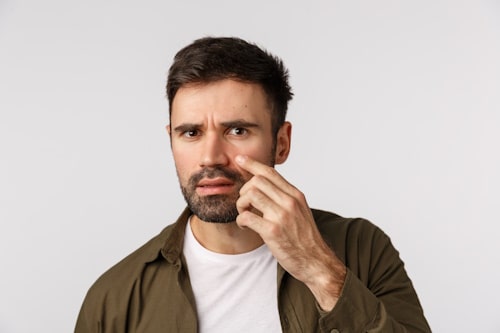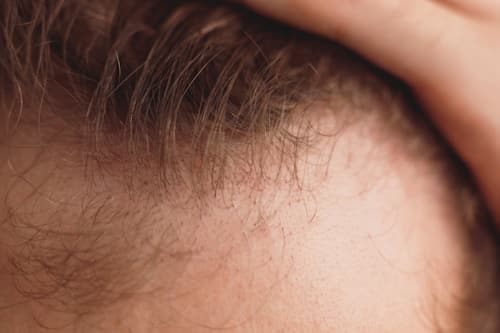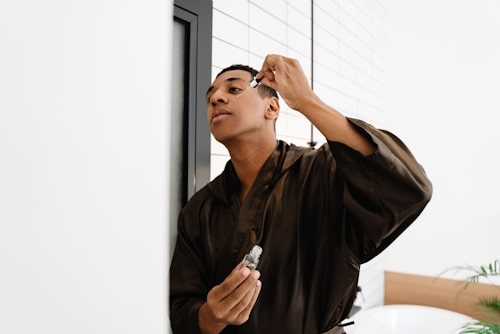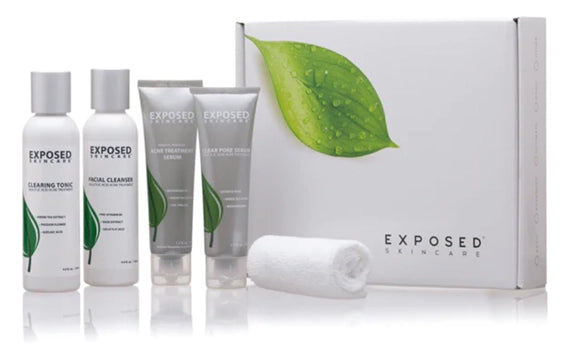Acne and hair loss are two common skin and hair concerns that affect many people. While they might seem like separate issues, there is a surprising connection between acne and hair loss.
This comprehensive guide will dive deep into the world of acne and hair loss, shedding light on the underlying causes and how they manifest together.
Also read: How to choose the best acne treatment
Biggest Take-Aways:
- Acne and hair loss are interconnected, often influenced by hormonal imbalances affecting the skin and scalp.
- Medications like spironolactone, oral contraceptives, and isotretinoin highlight the relationship between hormonal treatments and acne causes.
- A consistent skin care routine is pivotal in managing acne and can also play a role in promoting thicker hair growth.
- Exposed Skin Care stands out as an effective solution, addressing the root causes of acne while supporting overall skin health.

Understanding Acne: More Than Just a Pimple
What Causes Acne?
Acne manifests when hair follicles become clogged with oil and dead skin cells. This clog can cause a pimple, which may present itself as whiteheads, blackheads, or cystic acne.
Hormonal changes, especially an increase in androgen production, can boost oil production, leading to acne breakouts. Conditions like polycystic ovary syndrome (PCOS) can also cause adult acne and excess facial hair, linking the worlds of skin and hair even closer.
Common Types of Acne
- Hormonal Acne: Often appearing around the jawline and during menstrual cycles or premenstrual periods. They may be a result of stress or hormonal imbalance.
- Scalp Acne: Pimples or breakouts that occur on the scalp. Using hair care products unsuitable for your scalp or clog pores can trigger scalp acne.
- Cystic Acne: Deep, painful breakouts that can leave scars. Often a result of hormonal imbalances, especially during conditions like PCOS.
The Mystery of Hair Loss
Hair Loss: Beyond Thinning Strands
Hair loss, or thinning hair, can be alarming when you notice it. Understanding the underlying cause can go a long way in addressing the issue. Many factors, from hormonal to genetic, can influence hair growth and lead individuals to experience hair loss.

Key Causes of Hair Loss
- Hormonal Imbalance: Hormones play a pivotal role in hair growth. Imbalances, especially in androgen hormones, can lead to thinning hair or even conditions like hirsutism, where women experience excess facial hair.
- Stress: Chronic stress can elevate cortisol levels, the stress hormone, leading to hair thinning. It's not just a result of stress but how our adrenal glands respond.
- Scalp Conditions: Dandruff or other dermatology concerns can also cause hair loss. Ensuring a healthy scalp environment is crucial for optimal hair growth.
How Acne and Hair Loss Intersect
The Hormonal Link
The bridge between acne and hair loss primarily lies in hormones. As mentioned, androgen production can cause acne, but it also plays a role in hair thinning.
DHT, a derivative of testosterone, is known to shrink hair follicles, leading to hair loss. Similarly, in conditions like PCOS, where there's an increase in androgenic hormones, women may experience both adult acne and hair loss.
Role of Skin and Hair Care Products
Many daily skin care and hair care products have ingredients that can clog pores or irritate the skin, leading to acne. Similarly, using products with harsh chemicals can weaken hair, leading to breakouts and hair thinning.
Scalp Acne: Where Skin Meets Hair
Scalp acne is where the world of acne and hair loss directly intersects. It's crucial to have a proper hair care routine to ensure your scalp remains healthy.
A buildup of products or an imbalance in the scalp's environment can manifest as acne, which, in turn, can affect hair growth.
Addressing Acne and Hair Loss
Effective Ingredients and Treatments
- Topical Solutions: Salicylic acid and benzoyl peroxide are common ingredients to treat acne. They help unclog pores and reduce inflammation.

- Hair Growth Stimulants: Minoxidil is a popular over-the-counter treatment to stimulate hair growth.
- Retinoids: These can help with acne by unclogging pores and improving skin texture.
- Natural Acids: Glycolic acid may help in skin exfoliation, while salicylic acid may help unclog pores.
Understanding Your Routine
To determine the cause of your acne or hair loss, take a close look at your daily skincare and hair care routines. Using products with ingredients like retinol or those that don't clog pores can be beneficial.
Sensitive skin individuals should be particularly careful to choose products that won't irritate or make acne worse.
Holistic Approach: Beyond Topicals
While topical treatments can address the appearance of your skin and hair, it's essential to look at underlying factors. Hormone levels, especially sex hormone levels, play a pivotal role in both acne and hair loss.
If you're facing irregular menstrual cycles, talk to your healthcare provider about conditions like polycystic ovary syndrome. Addressing the root cause, like hormonal imbalance or stress, can be more effective than just treating the symptoms.
The Benefits of Using Exposed Skin Care to Manage Acne
In the vast world of skin care products, Exposed Skin Care is a superior choice for managing acne.
Here are the benefits of Exposed Skin Care:
- Addressing Root Causes: Understanding that acne can be caused by various factors, Exposed Skin Care targets the common cause, such as excess oil production.
- Holistic Treatment: Unlike typical acne medications that offer a one-size-fits-all approach, Exposed Skin Care offers a comprehensive range of products tailored to different acne causes.
- Prevents Flare-Ups: With its potent ingredients, it can help to reduce the increase in sebum production, a primary reason acne affects many.
- Ideal for All: From treatment for female-specific acne concerns to addressing occasional flare-ups, it's a versatile solution for all.
Incorporate Exposed Skin Care into your regimen and witness a transformative change in your skin's health and appearance.
Conclusion
Acne and hair loss, though seemingly distinct, share common underpinnings. Many skin care products on the market claim to address these issues, but it's crucial to pinpoint products that tackle the heart of the problem.
The common cause between these two concerns often revolves around hormonal imbalances. Acne can be caused by an overproduction of sebum by oil glands, influenced by hormones, exacerbating skin conditions.
Drugs like spironolactone, oral contraceptives, and isotretinoin may be prescribed to treat hormonal and cystic acne, revealing the close relationship between acne causes and hormonal treatments.
Similarly, treatment for female-pattern hair loss may also tie back to these hormonal roots. Navigating the world of acne medications and treatments can be overwhelming, with the potential of flare-ups or unexpected reactions like an increase in sebum.
Incorporating a consistent skincare routine is essential. Not only can this help manage acne, it can also help to stimulate thicker hair growth. Exposed Skin Care offers a holistic approach, targeting the root causes of acne while promoting overall skin health.
FAQs
What's the connection between acne and hair loss?
Both acne and hair loss can be influenced by hormonal imbalances, often from conditions affecting the oil glands or hair follicles.
How do medications like spironolactone or isotretinoin impact acne?
Spironolactone and isotretinoin target hormonal imbalances and overactive oil glands, respectively, which are common causes of acne.
Why is the frontal hairline mentioned in the context of hair growth?
Some treatments and routines can stimulate thicker hair growth, especially around the frontal hairline, an area commonly affected by hair thinning.
What's the role of a consistent skincare routine in managing acne?
A regular skincare routine helps in managing sebum production, reducing flare-ups, and ensuring overall skin health.
How does Exposed Skin Care fit into acne management?
Exposed Skin Care offers a comprehensive approach, targeting the root causes of acne with a blend of advanced scientific ingredients and natural extracts to promote overall skin health.


















